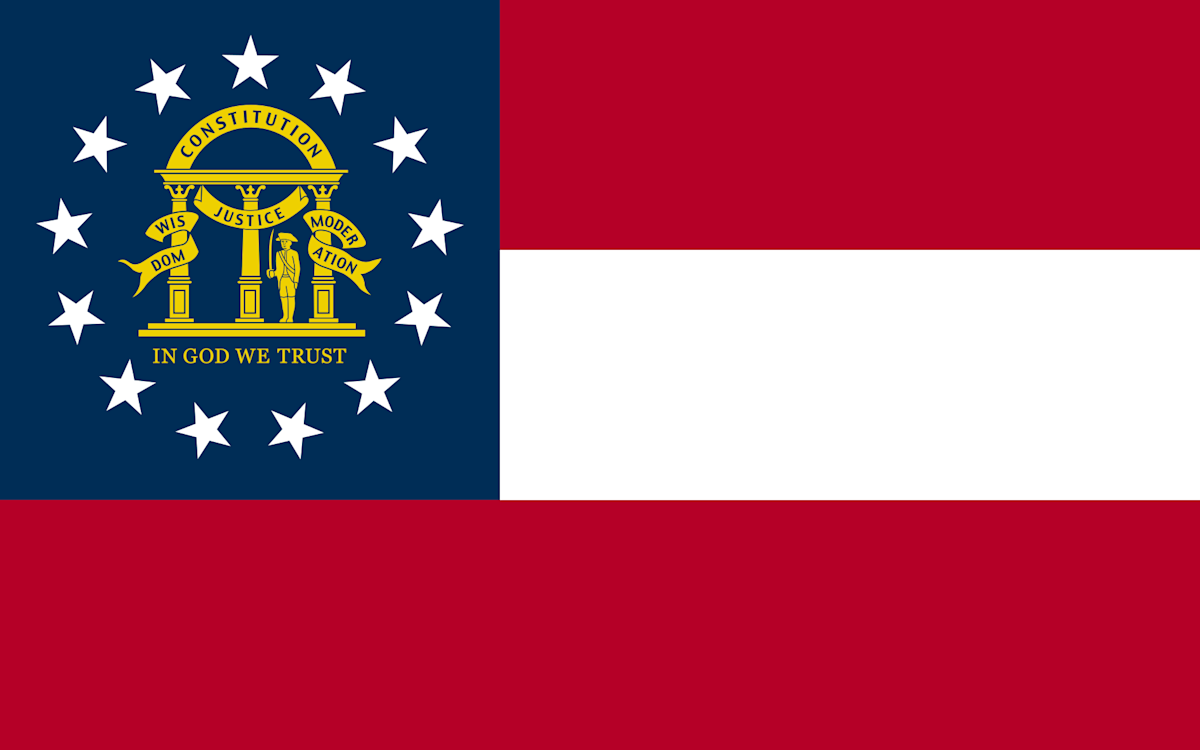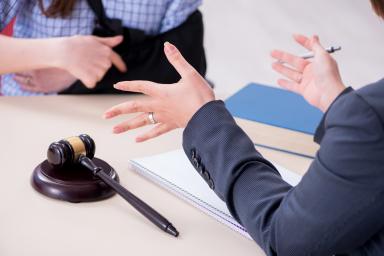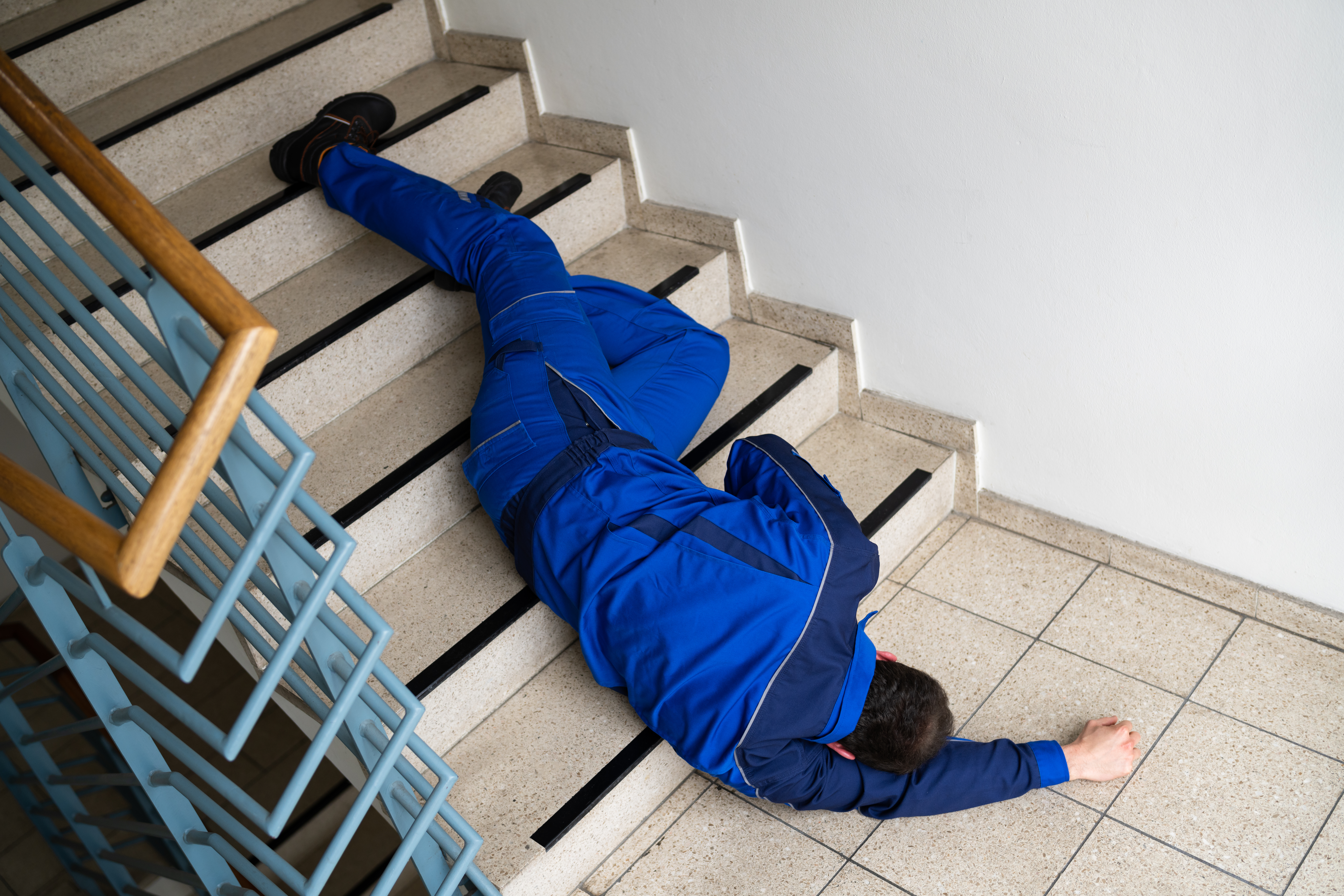Georgia Slip-and-Fall Laws

The National Floor Safety Institute estimates that slip-and-fall accidents lead to over one million emergency room visits per year. They are also a common cause of personal injury lawsuits. In 2020, a woman received over $1,000,000 in damages from a Georgia restaurant after slipping and falling on a poorly-maintained staircase.
If you have been a victim of this common injury, you may be considering a lawsuit as well. This page will inform you about Georgia’s slip-and-fall and premises liability laws, including the conditions that make for a viable lawsuit, how damages are calculated, and how long you have to pursue legal action. You will also find some helpful external resources for people who have recently been injured.
Georgia Premises Liability Law
Georgia’s premises liability laws state that a landowner is expected to “exercise ordinary care” in protecting invited guests from injury. If a guest is injured due to unsafe conditions on the premises, they may have grounds for a lawsuit against the landowner.
A property owner will only be responsible for a plaintiff’s injuries if the plaintiff can show that the property owner exhibited negligence. Georgia defines negligence as the lack of the “degree of care which is exercised by ordinarily prudent persons.” Some examples of negligent property ownership in a retail or grocery setting include wet floors, loose floorboards, loose handrails, and poorly-lit stairwells. A homeowner who fails to warn visitors about a slippery or uneven basement staircase, an aggressive dog, or any other hazardous conditions in their home could also be legally responsible for any resulting injuries.
Defining Invitees in Georgia Premises Liability Lawsuits
A premises liability claim will only be successful if the landowner should have expected visitors on their property. With few exceptions, plaintiffs in a premises liability lawsuits will be either invitees or licensees.
An invitee is any person who is either explicitly or implicitly invited to the landowner’s property, usually for business or commercial purposes. A retail store that is open to the public implicitly invites anyone to enter, making anyone who enters the store an invitee. Landowners owe a great deal of care to invitees, and Georgia law makes them responsible for any injury that invitees experience due to unsafe conditions.
Someone who is allowed to visit a person’s property for reasons other than business, such as a friend or a neighbor, is a licensee. Landowners do not owe as great a duty of care to licensees as they do to invitees. A licensee can only collect damages from a landowner for “willful or wanton injury.” The landowner must express either extreme negligence or the intent to injure the licensee in order for the licensee to have a viable lawsuit.
Since trespassers are neither invitees nor licensees, they cannot collect damages for a slip-and-fall or any other premises liability-related injury.
Georgia Attractive Nuisance Doctrine
Georgia’s premises liability law states that owners of property featuring an attractive nuisance are responsible for the safety of extends to owners of property that features an attractive nuisance. An “attractive nuisance” is a feature of a property that the owner should expect children to be drawn to.
A common example is a swimming pool: someone with a ppool in their backyard may not explicitly invite neighborhood children to swim in it, but should expect that some children will do so regardless. That landowner is responsible for exercising ordinary care to ensure that trespassing children do not hurt themselves. If the owner leaves the pool unsecured and filled with water and a trespassing child injures themselves while swimming in it, a judge could consider the landowner negligent for failing to drain, cover, or lock up the pool when they were not around to supervise it.
Someone whose child was injured by an attractive nuisance on someone else’s property may have a viable premises liability claim against the landowner.
Georgia Comparative Negligence Law
Georgia tort law has a modified comparative negligence clause. Comparative negligence means that a plaintiff can collect damages even if they were partially at fault for their injuries, and their payment will be reduced by their share of fault. For example, someone might file a lawsuit after slipping and falling on an icy sidewalk outside a storefront. It is the store owner’s responsibility to remove slipping hazards such as ice from their property, so they are at least partially responsible for the fall. However, if the plaintiff usually needs a cane to walk but was not using it when they fell, they could also be partially at fault. If a court found the plaintiff 40% responsible for their injuries, they would receive 60% of their damages.
Modified comparative fault means that the plaintiff can only recover damages if the defendant is majorly responsible for their injuries. If the court decides that a plaintiff is 51% at fault for their fall, they will not receive damages.
Georgia Business Liability Insurance Requirements
Georgia requires all businesses with three or more employees to provide coverage for workers’ compensation, whether through an insurance company or as a self-insurer. Businesses with company vehicles are also required to be insured for at least $75,000 per accident, which breaks down to $50,000 for personal injury and $25,000 for property damage. Georgia businesses do not have to have liability coverage for slip-and-falls or other injuries to customers.
However, an uninsured business owner runs the risk of paying substantial out-of-pocket settlements for premises liability claims and lawsuits. Many companies subscribe to commercial general liability (CGL) insurance, which might include premises and operation coverage. While legally optional, CGL insurance can protect business owners from the financial impact of a premises liability claim.
How Much Can Someone Sue For a Slip and Fall in Georgia?
Georgia does not limit the amount of economic or noneconomic damages that someone can receive for a slip and fall accident. If your lawsuit is successful, you can be compensated for the financial losses stemming from your injury and your pain and suffering.
If the defendant in your slip and fall claim exhibited gross negligence, you might be awarded additional punitive damages. Unless the defendant intentionally tried to harm you or was intoxicated, these damages will be limited to $250,000.
If the defendant in your lawsuit is a state entity, you cannot receive more than $1,000,000 in damages.
The Statute of Limitations in Georgia
Georgia has a two-year statute of limitations for personal injury claims. The statute of limitations includes a “discovery rule,” meaning that the two-year limit is calculated as starting from when the plaintiff discovers that their injuries were the cause of another person’s negligence.
In many cases, the statute of limitations begins at the time of your injury. If you broke a bone by slipping and falling on an unmarked wet floor, you would be aware of your injury and its cause as soon as it happened. However, other injuries take longer to reveal themselves. If you hit your head in a slip-and-fall accident and later discovered during a medical checkup that you suffered brain damage as a result, your statute of limitations would be two years from the date of the checkup, not the injury.
Resources for Injured Folks in Georgia
A slip-and-fall injury can unexpectedly alter the course of your life, and you may be unsure how to deal with the changes. These resources can help you cope with the medical and economic fallout of a serious injury by connecting you to healthcare and emotional support and allowing you to share your concerns with the responsible parties.
Health Insurance Marketplace
If you have recently been injured in a slip-and-fall, it is important that you receive a medical checkup as soon as possible. If you are uninsured, you may be having trouble finding an affordable source of healthcare.
The federal government’s Health Insurance Marketplace can connect you to a medical insurance plan that fits your needs. Using their website, you can compare the various plans that you are eligible for based on cost, copays, and coverage. You can also find out whether or not you are eligible for Medicaid, CHIP, or other plans that give low-income individuals access to health insurance.
Visit: https://www.healthcare.gov/
Better Business Bureau
If you have been injured in a slip-and-fall on a commercial property, it is possible that your accident was the result of negligent practices on the part of the business. If you are interested in seeing that the company is held accountable for their unsafe practices, you can report them to the Better Business Bureau.
The BBB is a nonprofit that lets members of the public share their experience with businesses. If you have concerns about a business that you feel should be heard, you can file a complaint with the BBB, who will then contact the business on your behalf.
Visit: https://www.bbb.org/
Brain Injury Association of Georgia
A slip-and-fall can lead to severe long-term medical complications, including traumatic brain and spine injuries. A TBI can substantiall affect your quality of life, including your ability to perform basic daily tasks.
The Brain Injury Association of Georgia aims to help individuals who are dealing with TBIs. They offer brain injury support groups, ID cards to help someone with a TBI easily share their status with others, and resources to support caregivers who are helping someone else through a brain injury.
Expertise.com StaffAuthor
Step into the world of Expertise.com, your go-to hub for credible insights. We don't take accuracy lightly around here. Our squad of expert reviewers, each a maestro in their field, has given the green light to every single article you'll find. From rigorous fact-checking to meticulous evaluations of service providers, we've got it all covered. So feel free to dive in and explore. The information you'll uncover has been stamped with the seal of approval by our top-notch experts.

![How Much Does a Slip-and-Fall Lawyer Cost? [2023] DUP IMAGE](https://images.ctfassets.net/k00sbju4hbzq/6VjmgolPspyVjYLOfVY4wl/a1f9b84358d5e0069656c41ac3e63e96/Depositphotos_260604210_XL.jpg?fit=fill&w=384&q=75)


